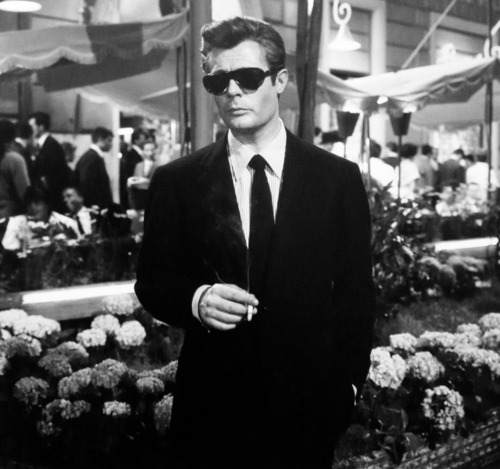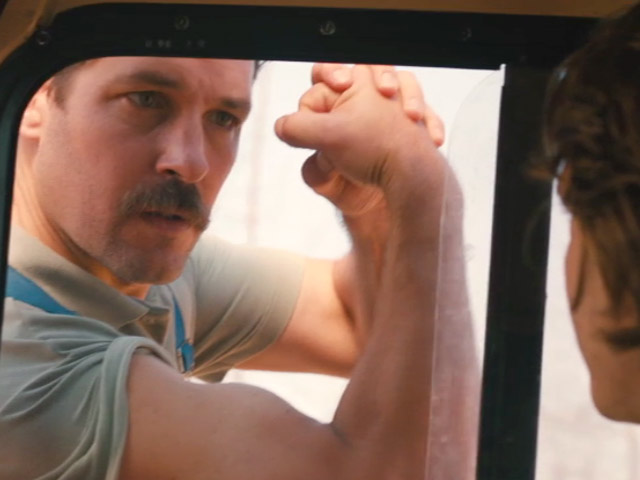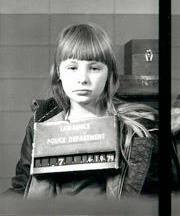The Church of Italian Men: The Creature
 En route to the coffee shop this Sunday morning, I was about as cross as I ever get. My 12-year-old car had been making a noise so ominous that I’d been forced to hoof it through the rain, and my cute umbrella was nowhere to be found. To make matters worse I was uncharacteristically nursing a hangover, which not only made coffee essential but the walk to fetch it pure misery.
En route to the coffee shop this Sunday morning, I was about as cross as I ever get. My 12-year-old car had been making a noise so ominous that I’d been forced to hoof it through the rain, and my cute umbrella was nowhere to be found. To make matters worse I was uncharacteristically nursing a hangover, which not only made coffee essential but the walk to fetch it pure misery.
Suffice it to say I’d not had the greatest Saturday night. It’d been the stuff of which Cathy Comics, rather than French movies, were made, and my hangover stemmed as much from the company I’d kept as from anything I’d actually imbibed.
So it was a morning when no one would’ve dared claim I was looking my best. Puffy-eyed and sallow, I was wearing the same matronly blue dress I’ve worn nearly every morning this summer—in my defense, dresses with pockets are very hard to come by—and my unbrushed hair stank of other people’s cigarettes and bad perfume. Nonetheless, as I passed the local pasticcera, one of the Italian fellows loitering under its awning looked me up and down, let out a low wolf whistle, and winked. Instantly I felt a million times better.
I’ve never been offended by that kind of male attention, never thought it compromised any of my deeply felt feminist principles. True, I don’t dig hustles or the you-like-what-I-like-so-I-like-you narcissism that passes for modern courtship. But a guy who just puts it out there without telegraphing his desire as a threat? Fuggedaboutit. That’s old-school Brooklyn in the very best way. More to the point, that’s Italian men.
To be clear, I don’t mean “Italian-American” men. I am referring to the men who were born in Italy rather than the ones who have an Italian grandmother. I am referring to the men who bolt espressos rather than Dunkin’ Doughnut coffees to keep their hearts beating. I am referring to the men who mostly speak in grunts, hisses, and explicit hand gestures.
I had one of those boyfriends. He was tall and broad-shouldered with long, ropy arms, old-soul eyes, and tanned, rosy skin. I met him not far from the Long Island beach house my friends and I rented one summer. He was working construction as a literal WOP—that old derogatory acronym for an Italian guy without papers—and when I walked by his site he whistled through his teeth. I looked up to find him nodding his head. “Principessa,” he said. Or at least that’s what I thought he said. I was distracted by his slow, sexy grin. Continue Reading →
Death by Casting: Prince Avalanche’s Tale
 Prince Avalanche begins as silently as any of David Gordon Green’s films do: with footage of the forest fire-ravaged 1988 Texas landscape, followed by the figures of two men wordlessly performing roadwork in the same area. The images are lovely and terrible, lackadaisical and strained—the oddly comforting dissonance that characterizes all of Green’s dramas.
Prince Avalanche begins as silently as any of David Gordon Green’s films do: with footage of the forest fire-ravaged 1988 Texas landscape, followed by the figures of two men wordlessly performing roadwork in the same area. The images are lovely and terrible, lackadaisical and strained—the oddly comforting dissonance that characterizes all of Green’s dramas.
But as the film revs up, the THC-inspired goofiness of his comedies The Pineapple Express and Your Highness quickly creeps in. The two men are Alvin (Paul Rudd) and Lance (Emile Hirsch), and we grasp their Abbot and Costello dynamics long before we sort out any other details of their relationship. While tasked with repairing the roads in the region, they are roughing it in the wilderness. Alvin, older, heftier, and more self-possessed, gently bosses Lance, who seems impervious to everything above the waist. (You know you’re dealing with unusually short men when Rudd looms as the big man in the duo.) While Alvin writes letters and studies German, Lance flips through comic books. While Alvin sleeps in their shared tent, Lance jerks off. The elder’s Achille’s heel reveals itself soon enough, however: It’s Madison, Lance’s sister, whom Alvin loves but also has fled. In his own way, Alvin is at least as much of a fuckup as Lance, whom he has speculated may be “mildly retarded.”
When the weekend arrives, Lance hightails it back to town in the hopes of getting laid, and Alvin basks in his solitude. He fishes; he reads; he wanders through the woods, a reverie of saturated greens and rust colors. And it’s at that point that Paul Rudd, rather than Alvin, begins to shimmer into focus. For Alvin gets silly as only Rudd can: He flops in the water. He does a weird jig. He juts his hip out at a crazy angle. He is, in other words, too cartoonlishly outsized to read legibly as a guy foolish only in his degree of anal-retentiveness—a guy who has sought a Thoreau-like isolation to cool his dangerous temper. Alvin may be slotted as the straight man in this mundo bizarro but Rudd can’t help but put a wag in his tail. Continue Reading →
On Living Softly, and Not Having a Big Stick
Growing up, “soft” was an insult. The ultimate one, actually. In my family it was an umbrella term that meant out-of-shape, clueless, indolent, addled, un-vigilant, prissy, overly sensitive, entitled. You were soft if you didn’t take it on the chin. Soft if you asked for a ride when you could walk. Soft if you whined “I can’t.” Soft if you couldn’t run a mile or sported a gut. Soft if you cried when you dropped your ice cream. Definitely soft if you were a tattletale.
Every usage of the word was anathema to us, and by “us,” I am referring to my dad and thus my little sister, my mother, my myself—my father’s subjects, the peasants to whom principles came down by edict.
Soft hands meant you lacked a work ethic, the might or tenacity to do physical labor. A soft voice meant you were namby-pamby, couldn’t assert yourself. Being soft-hearted meant you were a sucker. There was a long list of what was soft, and crowing it were the rich people in my Greater Boston town, which literally had a “wrong side of the tracks” since the Mass Pike divided the more working-class sections from the wealthier people on the Hill. The rich girls wore expensive rugbys and braids, had sleepover parties with cutesie PJs, whispered about their crushes. The girls in my neighborhood wore tight designer jeans and feathered hair, hung out at the corner store, had boyfriends with whom they did a lot more than hold hands though we were all years before puberty.
Though gentle, Charlie Bucket was not soft, which is why he inherited the Chocolate Factory. Harriet the Spy was not soft; all you had to do was look at her work uniform and know she was tough as nails. In those slippers and knitted sweaters, Mister Rogers and his braying singsong were ridiculously soft. And the Beatles, oy the Beatles. With their thin voices, those fa-la-la proclamations of love—forget it. So soft. As a matter of fact, all white music was soft, except punk rock and, of course, the Stones. With their big bass lines and bigger tongues, the Rolling Stones were hard in every sense of the word. Before I even understood what sex entailed, I groked that the Beatles were the equivalent of making love and the Stones were all about fucking. Which, by definition, was not soft. (It took me a lot longer to recognize how racial commodification and femmephobia tied into my received notions of softness.) Continue Reading →

